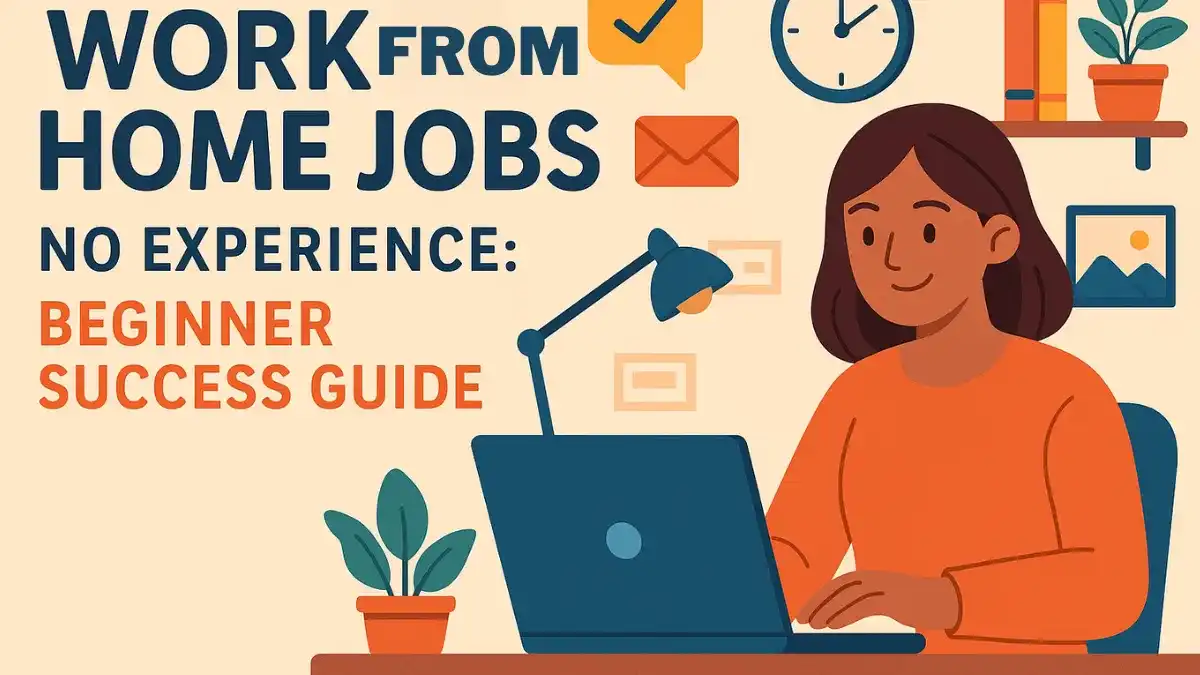## Landing Your Dream Remote Job: A Beginner’s Guide to Work From Home Jobs Success (Even With Zero Experience!)
You’re scrolling through job listings, heart sinking a little more with each “minimum 3 years experience required” or “on-site presence mandatory.” Maybe you’re a fresh graduate in Mumbai, tired of the soul-crushing commute. Or a parent in Pune needing flexibility. Or someone in Bangalore looking for a career pivot but hitting a wall. That dream of working remotely, earning a decent income, and having control over your time feels impossible, especially when you lack traditional experience. Sound familiar? You’re not alone. Thousands are searching for that exact magic key: “work from home jobs no experience.” The good news? That door isn’t locked. It’s wide open, and this guide is your key. Forget the intimidating jargon and unrealistic expectations. We’re cutting through the noise to show you exactly how to land a legitimate remote job, starting from absolute zero. Let’s get you set up at your kitchen table, balcony, or local café, earning on your terms.
Why “No Experience Needed” Remote Jobs Aren’t Just a Myth (Anymore!)
Remember when remote work seemed reserved for tech gurus or seasoned executives? Those days are gone. The shift towards flexible work isn’t just a pandemic blip; it’s a fundamental change driven by both companies and talent. Think about it:
- The Cost Factor: Companies, especially startups and SMEs in hubs like Hyderabad or Gurgaon, save big on office space and overheads by hiring remotely. This makes them more open to investing in training raw talent.
- The Talent Pool Explosion: Employers aren’t limited to hiring within a 20km radius of their Bangalore office. They can find the *right* person, regardless of location – maybe that’s you in Jaipur or Kochi!
- Tech Makes it Easy: Tools like Slack, Zoom, and cloud-based project management platforms mean managing remote teams is smoother than ever. Your ability to learn these tools quickly is often valued more than years in a specific role.
- Skills Over Pedigree: Many remote-first companies prioritize demonstrable skills (like clear communication, problem-solving, or using specific software) over formal degrees or lengthy resumes. They care about what you *can* do, not just where you’ve been.
Consider Priya from Ahmedabad. A commerce graduate with no corporate experience, she felt stuck. She started offering basic social media scheduling for a small local boutique she found on Facebook, learning as she went. Within 6 months, she’d built a portfolio showcasing her results (increased engagement!) and landed a part-time remote role with a Delhi-based digital marketing agency. Her “experience” was built through small, practical actions, not years in an office. Digital Smart Careers sees this pattern constantly – initiative trumps inertia every time.
Your Launchpad: Top Entry-Level Remote Roles You Can Target NOW
So, what jobs *actually* hire beginners remotely? Focus on roles where your core skills matter most:
| Role | What You Do | Skills Needed (Learnable!) | Where to Find Them |
|---|---|---|---|
| Customer Support Champion | Answer queries via chat, email, or phone. Help solve problems for users. | Patience, clear writing/speaking, basic tech savviness, empathy. | Startups, SaaS companies, e-commerce giants (many have India-based remote teams). |
| Data Entry Specialist | Input information accurately into spreadsheets or databases. | Attention to detail, fast typing, basic Excel/Google Sheets. | Market research firms, e-commerce backends, administrative support companies. |
| Virtual Assistant (VA) | Manage emails, schedules, travel, research, social media for busy professionals or entrepreneurs. | Organization, communication, internet research, discretion. | Small business owners, executives, coaches (found via LinkedIn, VA platforms). |
| Content Writer (Junior) | Write simple blog posts, product descriptions, social media captions. | Good grammar, basic research, ability to follow briefs. | Content agencies, marketing departments, blogs needing regular updates. |
| Social Media Helper | Schedule posts, find relevant content, engage with comments (under supervision). | Understanding of platforms (FB, Insta, Twitter), basic creativity, scheduling tools. | Small brands, agencies, influencers. |
Arjun, based in Chennai, started with zero formal experience. He loved gaming and was active in online communities. He began offering basic community moderation for a small gaming forum. This built his profile. He then took a free online course on customer support tools (like Zendesk). Within months, he applied his community skills and new tool knowledge to land a remote customer support role for an international gaming app. His passion became his experience.
Building Your “Experience” When Your Resume Looks Empty
No paid experience? No problem. Your task is to *create* proof you can do the job. Here’s how:
- Volunteer Strategically: Offer your skills to a local NGO in Pune needing social media help, a friend’s startup in Mumbai requiring data organization, or an online community. Document your contributions! (“Managed weekly Instagram posts for X NGO, increasing follower engagement by 15%”).
- The Power of the Passion Project: Start a simple blog about a hobby (even cooking or local travel!), manage a small Facebook group, or create basic guides. This shows initiative, writing ability, and basic digital skills. “Ran a local food blog sharing recipes and restaurant reviews” is valid experience!
- Micro-Freelancing: Platforms like Upwork or Fiverr aren’t just for experts. Offer small, beginner-friendly gigs: “I will transcribe 10 minutes of audio for ₹200,” or “I will research 10 potential clients for your business.” Complete even 5-10 small gigs successfully – these become powerful proof points.
- Free & Cheap Learning is Gold: Don’t just say “I’m willing to learn,” show it. Completing free certifications makes a huge difference:
- Google Digital Garage (Digital Marketing Fundamentals)
- HubSpot Academy (Inbound Marketing, Sales, CMS Basics)
- Microsoft Learn (Basic Excel, Word, Teams)
- Zendesk for Customer Service Pros (Free Tier)
List these prominently on your LinkedIn and resume under “Certifications” or “Skills Development.” Digital Smart Careers always emphasizes showing, not just telling.
Crafting Your “No Experience” Remote Application: Stand Out & Get Noticed
Forget the generic resume blast. Targeting is everything:
- Resume Reality Check:
- Highlight TRANSFERABLE Skills: Did you organize a college event? That’s project management. Managed household budgets? That’s basic finance/data entry. Helped customers in a family shop? Customer service!
- Projects Over Positions: Create a dedicated “Relevant Projects” section. List your volunteer work, your blog, your Fiverr gigs. Describe what you *did* and, if possible, the outcome (e.g., “Created a simple Google Sheet system for local charity inventory tracking, reducing time spent by 2 hours weekly”).
- Keywords are Key: Mirror the language in the job description. If they want “attention to detail,” use that phrase. If they mention “Zendesk,” list it if you’ve learned it.
- The Cover Letter That Connects: This is your secret weapon for entry-level roles.
- Ditch the Generic: No “Dear Hiring Manager, I am applying for…”
- Start Strong: “As someone who thrives on helping others solve problems efficiently, I was immediately drawn to your Customer Support Associate role…”
- Address the “Experience Gap” Confidently: “While my professional background is evolving, I’ve proactively developed the skills crucial for this role. Through managing communications for [Volunteer Project] and completing [Relevant Certification], I’ve gained practical experience in [Specific Skill 1] and [Specific Skill 2].”
- Show Enthusiasm & Research: Mention something specific about the company. “I admire how [Company Name] supports remote workers in India through [Specific Initiative/Value].”
Think of Meera from Kolkata. She applied for dozens of remote VA roles with a basic resume listing her BA degree and no experience. Nothing. She then volunteered to manage emails for a small online coaching business for 2 weeks. She listed this as “Virtual Assistant Intern” on her resume, detailing tasks like “Managed daily email inbox, categorized inquiries, and scheduled client consultations using Calendly.” She also completed HubSpot’s free Email Marketing certification. Her next application, highlighting this *specific* project and certification, got her an interview. She landed the job.
Navigating the Remote Job Hunt: Where to Look & How to Avoid Scams
Finding *legitimate* entry-level remote jobs requires knowing where to dig:
- Job Boards (Use Filters!):
- Naukri.com, Indeed, LinkedIn: Use filters: “Remote,” “Work From Home,” “Entry Level,” “Fresher.” Search terms: “Remote Customer Support Fresher,” “Entry Level Data Entry WFH.”
- Remote-First Boards: RemoteOK (has an “Entry Level” filter), We Work Remotely, Himalayas.app, AngelList (for startups).
- Company Career Pages: Target companies known for remote culture (e.g., Zapier, GitLab, Buffer) or Indian companies advertising remote/hybrid roles. Look directly on their “Careers” page.
- Network (Yes, Remotely!):
- Optimize LinkedIn: Headline = “Seeking Entry-Level Remote Roles in [Customer Support/Data Entry/etc].” Connect with recruiters at target companies. Engage with their content thoughtfully.
- Join relevant online communities: Facebook Groups (e.g., “Remote Work India”), Discord servers, Reddit communities (r/forhire, r/RemoteJobs). Be helpful, not just asking for jobs.
- Beware the Scams (Red Flags!):
- “Too Good to Be True” Pay: ₹50,000/month for simple data entry? Scam.
- Pay-to-Play: Legitimate companies won’t ask you to pay for training, software, or a “starter kit.”
- Vague Job Descriptions: No clear company info, role details, or interview process.
- Unprofessional Communication: Poor grammar/spelling, generic email addresses (Gmail/Yahoo instead of company domain), rushed hiring.
- Check Glassdoor & Google: Always research the company name + “scam” or “reviews.” Digital Smart Careers urges caution – trust your gut. If it feels off, it probably is.
From Application to Offer: Acing the Remote Interview
You got an interview! Now, convince them you’re remote-ready:
- Tech Check is Non-Negotiable:
- Test your internet connection, webcam, and microphone WELL before the call.
- Use a quiet, well-lit space with a neutral background (a blank wall works!).
- Close unnecessary tabs/apps. Silence your phone.
- Showcase Remote-Ready Soft Skills:
- Communication: Speak clearly, concisely. Practice active listening (“So, to make sure I understand…”).
- Self-Motivation: “Can you tell me about a time you learned something new independently?” (Use your project/certification examples!).
- Problem-Solving: “If you encountered [common issue in the role] and couldn’t immediately reach your manager, what steps would you take?”
- Time Management: “How do you prioritize tasks when working independently?”
- Ask Insightful Questions:
- “What does a typical day look like for someone in this role?”
- “How does the team communicate and collaborate remotely?”
- “What training and onboarding support is provided for new remote hires?”
- “How is performance measured for remote team members?”
Remember Rohan from Delhi? He aced his remote support interview not just by answering questions, but by proactively asking about their ticketing system and mentioning he’d already explored the free version. He also shared screen of a simple troubleshooting guide he’d created during his volunteer gig. It demonstrated initiative and practical skill instantly.
Your Journey Starts Now: Quick Wins & Long-Term Growth
Landing that first remote job is incredible, but it’s just the beginning. Here’s how to thrive and grow:
- Master Remote Discipline: Set clear work hours (even if flexible), create a dedicated workspace (even a corner!), use tools like Toggl or Forest to manage focus time. Communicate proactively – don’t vanish for hours.
- Seek Feedback & Learn: Ask your manager for regular input. Use free resources like Digital Smart Careers articles or webinars on remote productivity and skill-building.
- Build Your Remote Network: Engage in virtual team meetings, join company Slack channels, connect with colleagues on LinkedIn. Attend online industry events or webinars.
- Keep Upskilling: Once settled, identify the next skill needed for promotion (e.g., learning a specific CRM, basic graphic design, project management fundamentals). Many platforms offer affordable courses.
That initial “work from home jobs no experience” search got you here. Now, you’re building a career defined by flexibility, growth, and control. The barriers weren’t your lack of a traditional background; they were simply not knowing where and how to start. You’ve cracked the code. Your home isn’t just where you live anymore; it’s where you build your future, one focused task, one learned skill, one successful remote day at a time. The world of work has changed. You’ve changed with it. Now, go make that home office (or balcony desk!) your launchpad for everything that comes next. You’ve absolutely got this.
Remote Success Starter Pack: Your Go-To Resources
FAQs:
- Q: Are these jobs actually legit? How can I be sure?
A: Research is key! Check company websites, LinkedIn profiles, Glassdoor reviews, and look for clear job descriptions and professional communication. Never pay money upfront. Trusted platforms (like LinkedIn, established remote job boards) have better safeguards than random WhatsApp forwards. - Q: What’s the realistic starting salary for entry-level remote work?
A: It varies by role and company. For basic data entry, VA, or support in India, expect ₹15,000 – ₹25,000/month for full-time roles initially. Focus on gaining experience first; salary grows with skills. - Q: Do I need super-fast, expensive internet?
A: Stable broadband is essential (aim for at least 25 Mbps). You don’t need the absolute fastest tier for most entry-level roles (chat/email support, data entry). Avoid relying solely on mobile data for core work hours. - Q: How do I stay motivated working alone?
A: Structure is vital! Set a routine, take breaks, leave the house, connect virtually with colleagues, and celebrate small wins. Join online communities for remote workers in India for support.
Essential Free Tools:
- Grammarly: Polishes your writing for emails, applications, and chats. (Free version is great).
- Trello or Asana: Simple tools to organize your tasks and job hunt (or work tasks later!).
- Google Workspace (Docs, Sheets, Drive): The backbone of remote collaboration. Master the basics!
5 Actionable Tips You Can Do TODAY:
- Polish Your LinkedIn: Update your headline to “Seeking Entry-Level Remote Roles in [Your Target].” Add any volunteer work or projects.
- Pick ONE Skill: Choose one free certification (e.g., Google Digital Garage basics) and start it today. Commit 30 minutes.
- Find ONE Micro-Task: Sign up for Upwork/Fiverr. Offer one simple service (e.g., 30 mins of online research) at a low rate to get your first review.
- Set Up Your Space: Identify the quietest corner. Test your internet speed (fast.com). Get headphones if needed.
- Apply to ONE Job: Find ONE role that genuinely fits. Spend 30 minutes tailoring your resume and cover letter using the tips above. Hit send!






